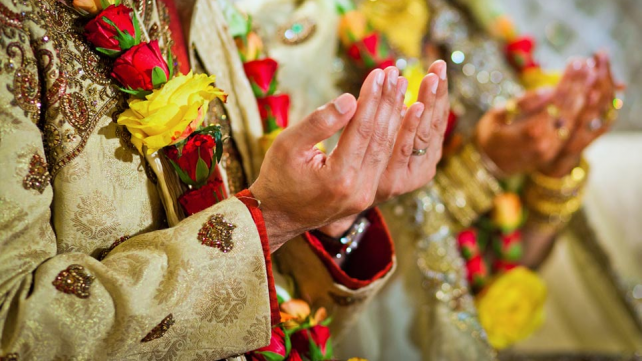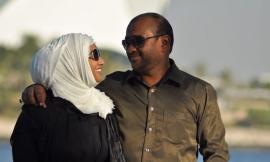
Sad but shocking reality: the divorce rate amongst Muslims in North America is one of the highest in the world.
According to New York-based Muslim sociologist Ilyas Ba-Yunus, Muslims in Canada and the U.S. have a divorce rate of 33 percent.
The world's highest is the general U.S. population's of 48.6 percent, followed by the United Kingdom's of 36 percent.
Many assume divorce means problems began in the course of the marriage, whether it was communication breakdown or irreconcilable differences.
But there are many difficulties that lead to divorce which could have been avoided right from the beginning. This could have happened if individuals, parents, guardians and Imams had played their role right when communication between two Muslims seeking marriage began.
Below, we give you some tips and advice of what you can do:
HOW PARENTS CAN HELP:
The older woman noticed her instantly.
The twenty-something girl was an American Muslima, her white skin and Caucasian features bore testimony to that. She was perfect for her dear son Muhsin.
As she walked closer to her, she noticed the young woman talking to someone of a darker complexion.
The woman rushed up.
“Assalamu alaykum,” she said smiling at the American Muslima.
“Wa alaykum as Salaam,” replied the sister and her friend in unison, both a bit startled by the enthusiasm and ardor with which they were being greeted.
“I would like you to marry my son,” said the woman barely inches away from the American Muslima, and making no eye contact at all with her friend.
“But, but why,” she stammered.
“Because you are white and you are wearing a Jelbab. You will make a perfect wife for my Muhsin!”
(This is based on a true story, in which the ethnicity of two of the people involved has been changed
*******
While some would be surprised at the candor and bluntness of the older woman in the above-mentioned scenario, such scenes are not uncommon. Many parents seem to think approaching a prospect out of the blue will “reserve” this person for their son/daughter.
If you as a parent want to play an effective role in helping your children seek the right mate, things have to be done differently.
1. Understand your role
Your role as a mother or father is not to be the final arbiter of your child's marriage. This may be how marriages were arranged “back home” in a Muslim country, but it is not the Islamic way. Nor is this way acceptable to most Muslims who have grown up in the West.
That said, the parents have a tremendous responsibility in the process. They:
a. suggest individuals as prospective spouses
b. thoroughly screen and check proposals, call references
c. act as the third party between the two candidates
2. Talk to your kids about what you both want.
Winnipeg, Canada-based Muslim social worker Shahina Siddiqui says parents have to sit down with their kids and openly discuss what kind of husband or wife s/he is looking for.
You may live in the same household as your children and think you know them inside out, but many parents are shocked to find their kids' ideas about who they want to marry can be drastically different from what they expected.
Marrying cousin X or Y from “back home” may just not be acceptable.
Or the nice boy or girl from the local cultural community who is highly educated and very well-off financially may be of little interest to a son or daughter because of their lack of Islamic knowledge and practice.
Open-mindedness and clear communication may reveal a side of your kids that may be hard to swallow. However, you must remember that marriage primarily affects the two people involved in the relationship. They must like the person they are marrying.
3. Clearly outline the rules of meeting a potential mate
Siddiqui says parents must set boundaries as to how and when they will meet prospective candidates.
Too often, Muslims stray by thinking seeking a mate is an excuse to engage in dating. Dating occurs when a man and woman spend time alone together. This is usually not with the intention of getting involved in a long-term or serious relationship. It is just to “have fun”. There is no little to no serious discussion of future plans and/or the intention to marry.
Dating can occur amongst two Muslims seeking marriage if they want to go out alone, with no third party present to “get to know each other”. This can also develop through hours of unnecessary phone or e-mail conversations.
Setting the boundaries of meeting a prospective mate is your responsibility as a Muslim parent.
The rules to remember include the following: the meeting must be chaperoned so the two are not alone together, both prospective partners are lowering the gaze and both are sticking to the topic in the course of discussions (for more explanation of some of these points see the article 6 Etiquettes of Seeking a Spouse at www.soundvision.com).
One suggestion Siddiqui gives in this regard is to avoid late night meetings between prospective candidates and chaperones because at the end of the day, people are tired, their defenses are down. For this kind of a meeting, all parties need to be very alert.
4. Give an allotted time for the meeting
Meetings between prospective spouses must not last for an extremely long time, like being away most of the day to meet this person. Parents should give an allotted time for the two to meet and talk.
5. Investigate thoroughly
One of the reasons for many divorces is the lack of proper investigation of a prospective marriage partner before marriage.
Parents have this heavy responsibility of finding out as much as possible about the individual who will possibly spend the rest of their life with their son or daughter.
Investigation does not mean just asking two or three family friends or community members. Deeper digging is necessary.
The case of one Imam's daughter in the U.S. serves as a chilling example.
This Imam asked a Muslim brother to check out a boy who was seeking marriage with his daughter. On the surface, all seemed fine. But upon further investigation it was discovered that he drinks alcohol. This fact was also confirmed by two other Muslims. The mediator in this case told Sound Vision that he never would have guessed, looking at the boy, that he drinks.
Aneesah Nadir, Director of Social Services for the Arizona Muslim Family Health and Social Services in Tempe provides another good way of fact checking on a proposal.
One sister she knows received a proposal from a brother who lived in a different city. To check this prospective mate out, one of her relatives went to the mosque this person attends and observed and talked to him without him knowing he was her relative. Her relative found the brother unsuitable and let her know about this.
6. Be honest
Parents as well as individuals looking for a spouse must be honest with regards to their credentials, background and other pertinent details about their personal lives.
Inflating your son or daughter's educational credentials, for example, will only backfire when checking reveals this is untrue.
7. Take your time.
Siddiqui stresses the importance of not rushing a son or daughter into marriage. If you find someone for your son or daughter at a two-day Islamic conference, for example, and this is the initiation of the process, more time must be given to checking facts and references.
Ideally, she says references should always be asked for and checked out before meeting in person. And this goes for boys and girls.
8. Never Be pushy
(Another true story)
A young Muslim sister, practicing, Hijab-wearing, bright (she was studying at one of America's most prestigious universities) stepped in front of a moving train in Chicago and killed herself.
Why?
Because her parents refused to listen to what she was looking for in a husband. They wanted to hand pick and completely decide who she would spend the rest of her life with.
This incident is an extreme example of the kind of pressure some parents apply to get their kids to marry the “right one”, often in complete variance with what the young man or woman is looking for.
Needless to say, this is not condoned by Islam. Neither is suicide as a way out of difficult situations.
Another form of pressure is put on those who are given a proposal. It is not uncommon to see sisters or their parents pursued by the parents of others who are interested in their son or daughter. This can even reach the level of harassment at times.
Forced marriages are not only unIslamic. They pose a danger to your children's future, as well as that of your grandchildren. Would you want your grandchildren to experience the pain and emotional turmoil of a divorce which could have been avoided if both parties had had more say in the choice of a partner?
HOW IMAMS CAN HELP
Imams in North America do more than deliver a weekly Khutbah and lead prayer. They are, whether they and others realize it or not, responsible for their community's emotional and psychological well-being as well.
So Imams don't just officiate marriages. They have to become involved with them as well. This role can take three main forms.
1. Being a guardian for sisters
Alhamdulillah, a large number of those converting to Islam are women. Most of these sisters should and do seek marriage with a Muslim. The problem though, is that they don't have the family support needed in seeking the right mate. In most cases they have been cast out of their families because of their conversion to Islam, or they just don't want non-Muslim family members involved in their marriage decisions.
This is where you, as an Imam, must step in .These sisters need to have a third party to advise and mediate on their behalf. Being new to the Muslim community, they don't usually know who is who and can be easily deceived. These Muslim women must be protected against abuse and deception on the part of men who may take advantage of their lack of knowledge of the community.
Imams should not wait for a sister to approach them. Once you see such a Muslima inquire discreetly if you can help in this important area of her life. She may feel shy asking you directly, so you may have to take the first step.
2. Vouching for good brothers
An Imam is a great reference for a brother who regularly attends a mosque and is Islamically involved. Helping practicing, honest and decent brothers marry with your “stamp of approval” will possibly increase their chances of getting married. Many Muslim women's parents and third party will feel a sense of assurance if an Imam vouches for a brother than if a friend or relative does.
3. Providing the right information
The Imam is also the best person to ask to confirm someone's Islamic practice. A brother may say he attends Mosque X in city Y, but this can only really be confirmed by the Imam there, who knows, for example who attends which prayers in congregation, who comes only at Juma or only on Eid.
As well, Imams are often asked for help by Muslims in their mosque and are keenly aware of their problems at some level. This can also help a third party seeking information about a prospective candidates who attends your mosque.
4. A note about Gheebah (backbiting)
While backbiting is generally forbidden by Islam, marriage investigations are an exception to this rule.
As an Imam, you may be told information about a person in confidence: financial problems, family abuse, drug and/or alcohol consumption, etc. While these and other problems should remain the business of the individual who has told you in general, in the case of marriage, you must provide complete information about someone you know has a problem.
If a father wants to know about the character of a brother who has proposed to his daughter, and you as an Imam know this brother does drugs, drinks, lies or steals, you must tell this father. His daughter's life is at stake here.
Seeking the right husband or wife is something to be commended for. It is also the responsibility of the Muslim community to help those who are seeking marriage in fulfilling this Sunnah and part of our faith.








Comments
it was good
Location
as-salamu alaikum wa rahmatullaMay Allah bless all of you for your service to His deen."Ad Deenu Naseeha" said the Prophet SAWS in hadith, and alhamdulillah, it's encouraging to see beautiful advice and guidance for all. The advice that you have given, the hints & tips if they were in practise we would without doubt see one of the most beautiful Islamic communities. I cannot epmhasise the quality and beauty of your advice. Please it keep it up.Jazakumullahu khairanMa'as salaamJunaid
Location
sala mulaikum,,,,i was introduced to this site by a sister i really appreciate what i read and i hope i' make good use of what i gained here, but i just find out that a lot of muslims nowadays dont even know what it takes t vow spending the rest of ones life with another, it's so sad .but this present situations we have now in the world especially in my locality, i see a lot of sisters out there single not married, not becourse they don't want to but becourse the brothers are not ready to settle down now, they 'r afraid of that institution called marriage.for those who are married i pray it as an act of ibadah for them all, for us who are still searching, may almighty allah make it easy for us and give us the best, amin.ma asalam
Location
Pages
Add new comment